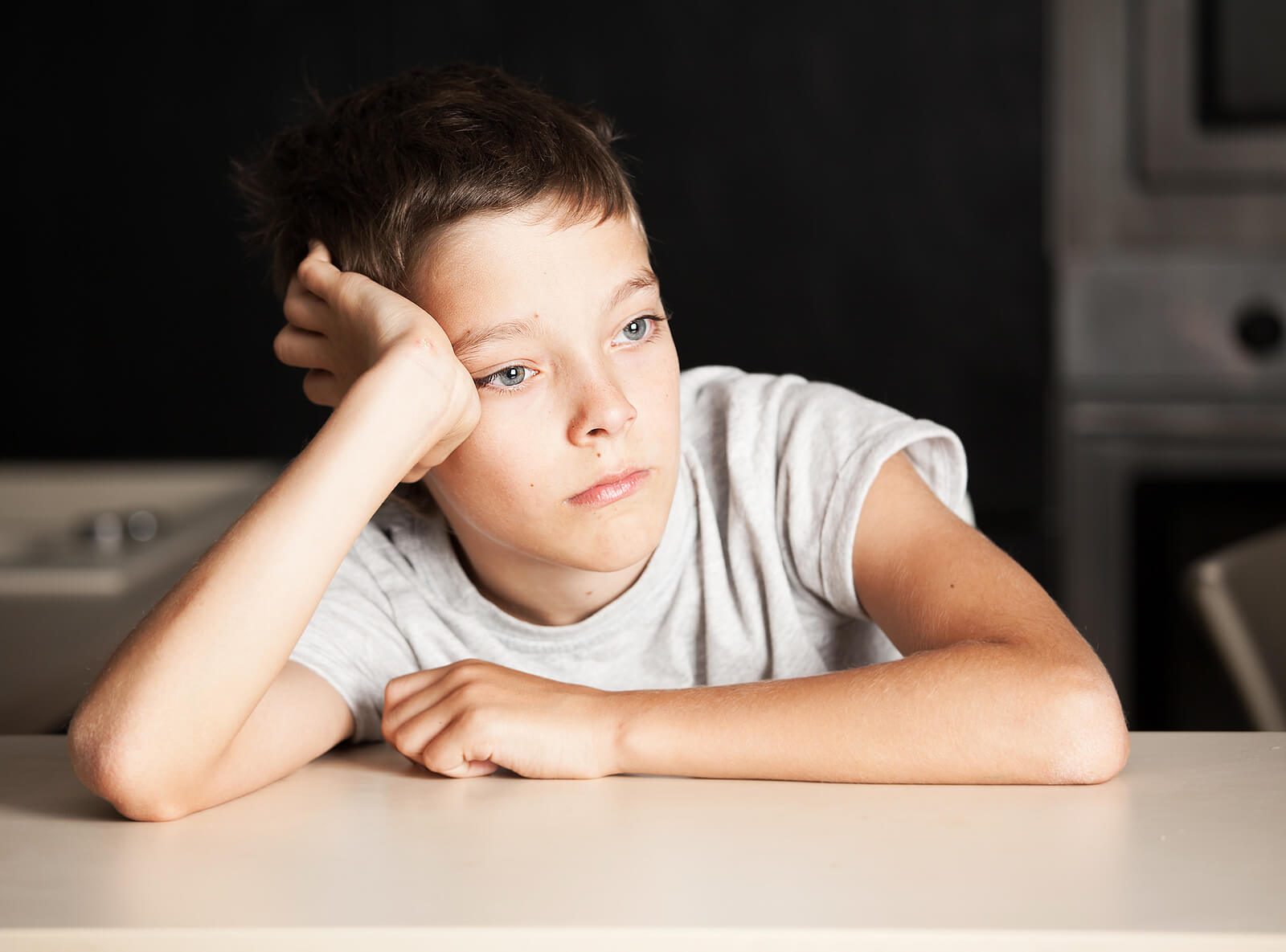Apathetic Children: When Nothing Interests Them


Written and verified by the psychologist Elena Sanz Martín
The image of a healthy child is full of life, curiosity, and enthusiasm. Open and energetic children, as well as reflective and introverted ones, are interested in many different things and show it. For this reason, when we observe apathetic children, it’s important to find out what’s happening to them.
No one knows their child better than their own parents. For this reason, they’re usually the first to identify these changes in attitude. It’s also possible that the school may notice the child’s lack of enthusiasm or collaboration. In any case, it’s important to stop for a few moments to listen to the child before becoming alarmed or pressuring them.
Apathetic children: How to identify the signs?
Like any other person, children don’t always have the same level of energy and enthusiasm. There are times when they’re tired, sick, or simply less active. This isn’t a red flag in all cases. However, if you notice that some of the following attitudes continue over time, you may need to take action:
- The child shows no interest in any type of activity, even those for which they previously showed enthusiasm.
- They’ve become more withdrawn and less sociable, even limiting interaction with friends and family.
- They don’t express their opinion and avoid making decisions. They generally express that “they don’t care about anything” and allow others to choose for them.
- Their energy level has decreased, they opt for sedentary activities, and even move and speak more slowly.
- They often display expressions of sadness, discouragement, and listlessness. Likewise, their words may denote pessimism and hopelessness for the future.

What happens to apathetic children?
First, it may be appropriate to rule out some organic cause of apathy in children. Certain nutritional deficits and some hormonal alterations can affect the mood and behavior of children.
For this reason, it’s important to consult with a pediatrician and perform the relevant studies in order to evaluate the child’s state of health. But it’s also necessary to look at the psychological and emotional environment in search of the following aspects.
Important changes in the child’s life
Transcendental events can affect children more than we imagine and these are often manifested through apathy.
A move, a change of school, the divorce of parents, or mourning the death of a loved one are events that can emotionally overwhelm any child. And by not having the necessary resources to express and manage what they feel, they may end up turning inward.
School or family problems
School and home are the two most relevant spaces in a child’s life. The dynamics and relationships that are established in them can significantly affect their mood.
Poor school performance, conflicts with teachers, or bullying by peers are some of the main challenges faced by children. All of them can cause discouragement, anxiety, and sadness, even leading the child to show a lack of interest.
Similarly, family conflicts deeply affect children, even when they don’t involve them directly. Witnessing fights between parents, having a bad relationship with one of them, or living in a home with a tense and negative atmosphere can take its toll on their emotional health.
Stress and exhaustion
Stress is also one of the main reasons that can lead children to apathy. Too many obligations, responsibilities, or activities can make them feel saturated and overwhelmed. In addition, the physical fatigue derived from their busy schedule only worsens the situation.
Excess stimulation
We may think that apathy’s related to boredom and that children need more stimuli to motivate them. Paradoxically, sometimes the opposite is true.
Children need time free of stimuli in order to play, explore, and discover what they like and what catches their attention. If we fulfill all their wants and needs, even before they arise, we deprive them of the valuable opportunity to get a taste of life.
Mood disorders
Finally, apathy may be a sign of a psychological disorder, such as depression or dysthymia. In these cases, consultation with a professional will be essential in order to help the child overcome it.

How to help apathetic children?
The first step is to identify the cause behind this attitude. Whenever possible, the solution will be to solve the trigger of the disinterest. For example, addressing school problems, improving a bad family environment, or reducing the load of daily activities.
However, in other cases, it will require doing personal work with the child to help them manage negative emotions of sadness, stress, or hopelessness.
Family communication will be the key to encouraging the child to express themself and find guidance from their parents.
However, professional support may often be necessary. It’s normal for parents not to know how to support their child in these circumstances, so it’s important to seek help as soon as possible. This avoids prolonging the apathy, which can lead to a more serious disorder in the future.
The image of a healthy child is full of life, curiosity, and enthusiasm. Open and energetic children, as well as reflective and introverted ones, are interested in many different things and show it. For this reason, when we observe apathetic children, it’s important to find out what’s happening to them.
No one knows their child better than their own parents. For this reason, they’re usually the first to identify these changes in attitude. It’s also possible that the school may notice the child’s lack of enthusiasm or collaboration. In any case, it’s important to stop for a few moments to listen to the child before becoming alarmed or pressuring them.
Apathetic children: How to identify the signs?
Like any other person, children don’t always have the same level of energy and enthusiasm. There are times when they’re tired, sick, or simply less active. This isn’t a red flag in all cases. However, if you notice that some of the following attitudes continue over time, you may need to take action:
- The child shows no interest in any type of activity, even those for which they previously showed enthusiasm.
- They’ve become more withdrawn and less sociable, even limiting interaction with friends and family.
- They don’t express their opinion and avoid making decisions. They generally express that “they don’t care about anything” and allow others to choose for them.
- Their energy level has decreased, they opt for sedentary activities, and even move and speak more slowly.
- They often display expressions of sadness, discouragement, and listlessness. Likewise, their words may denote pessimism and hopelessness for the future.

What happens to apathetic children?
First, it may be appropriate to rule out some organic cause of apathy in children. Certain nutritional deficits and some hormonal alterations can affect the mood and behavior of children.
For this reason, it’s important to consult with a pediatrician and perform the relevant studies in order to evaluate the child’s state of health. But it’s also necessary to look at the psychological and emotional environment in search of the following aspects.
Important changes in the child’s life
Transcendental events can affect children more than we imagine and these are often manifested through apathy.
A move, a change of school, the divorce of parents, or mourning the death of a loved one are events that can emotionally overwhelm any child. And by not having the necessary resources to express and manage what they feel, they may end up turning inward.
School or family problems
School and home are the two most relevant spaces in a child’s life. The dynamics and relationships that are established in them can significantly affect their mood.
Poor school performance, conflicts with teachers, or bullying by peers are some of the main challenges faced by children. All of them can cause discouragement, anxiety, and sadness, even leading the child to show a lack of interest.
Similarly, family conflicts deeply affect children, even when they don’t involve them directly. Witnessing fights between parents, having a bad relationship with one of them, or living in a home with a tense and negative atmosphere can take its toll on their emotional health.
Stress and exhaustion
Stress is also one of the main reasons that can lead children to apathy. Too many obligations, responsibilities, or activities can make them feel saturated and overwhelmed. In addition, the physical fatigue derived from their busy schedule only worsens the situation.
Excess stimulation
We may think that apathy’s related to boredom and that children need more stimuli to motivate them. Paradoxically, sometimes the opposite is true.
Children need time free of stimuli in order to play, explore, and discover what they like and what catches their attention. If we fulfill all their wants and needs, even before they arise, we deprive them of the valuable opportunity to get a taste of life.
Mood disorders
Finally, apathy may be a sign of a psychological disorder, such as depression or dysthymia. In these cases, consultation with a professional will be essential in order to help the child overcome it.

How to help apathetic children?
The first step is to identify the cause behind this attitude. Whenever possible, the solution will be to solve the trigger of the disinterest. For example, addressing school problems, improving a bad family environment, or reducing the load of daily activities.
However, in other cases, it will require doing personal work with the child to help them manage negative emotions of sadness, stress, or hopelessness.
Family communication will be the key to encouraging the child to express themself and find guidance from their parents.
However, professional support may often be necessary. It’s normal for parents not to know how to support their child in these circumstances, so it’s important to seek help as soon as possible. This avoids prolonging the apathy, which can lead to a more serious disorder in the future.
All cited sources were thoroughly reviewed by our team to ensure their quality, reliability, currency, and validity. The bibliography of this article was considered reliable and of academic or scientific accuracy.
- Revelli, V. K. (2016). Manifestaciones psiquiátricas de enfermedad orgánica en la población pediátrica. Recuperado julio de 2021, de https://psicoadolescencia.com.ar/docs/3/final17.pdf
- Guillén, E., Gordillo, M. J., Gordillo, M. D., Ruiz, I., & Gordillo, T. (2013). Crecer con la pérdida: el duelo en la infancia y adolescencia. International Journal of Developmental and Educational Psychology, 2(1), 493-498.
- Silva, N. L., & Caro, P. (2018). La desmotivación académica como consecuencia del acoso escolar en educación inicial en estudiantes de transición del colegio Liceo Pedagógico. Recuperado julio de 2021, de https://repository.unad.edu.co/bitstream/handle/10596/19200/52328149.pdf?sequence=3&isAllowed=y
This text is provided for informational purposes only and does not replace consultation with a professional. If in doubt, consult your specialist.








